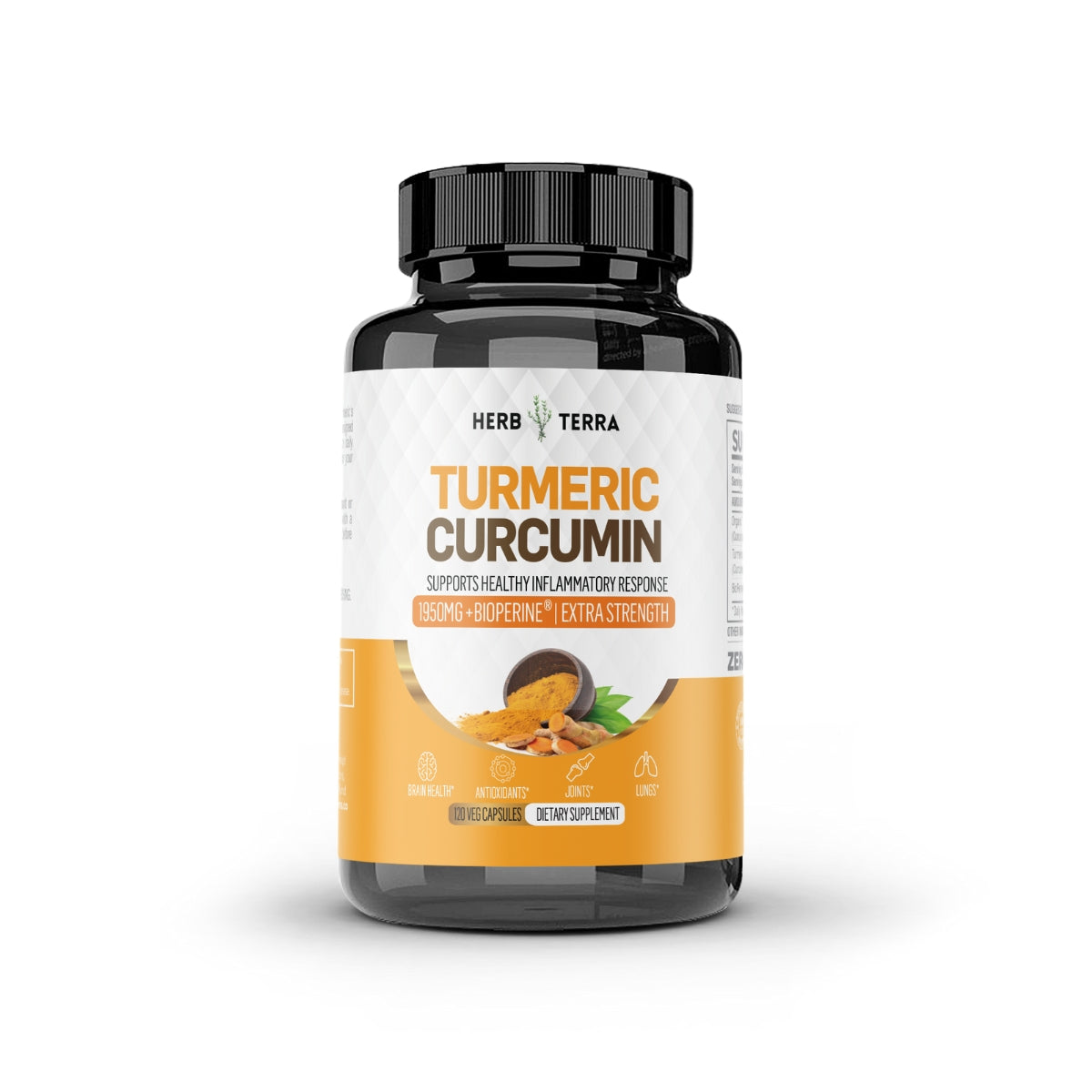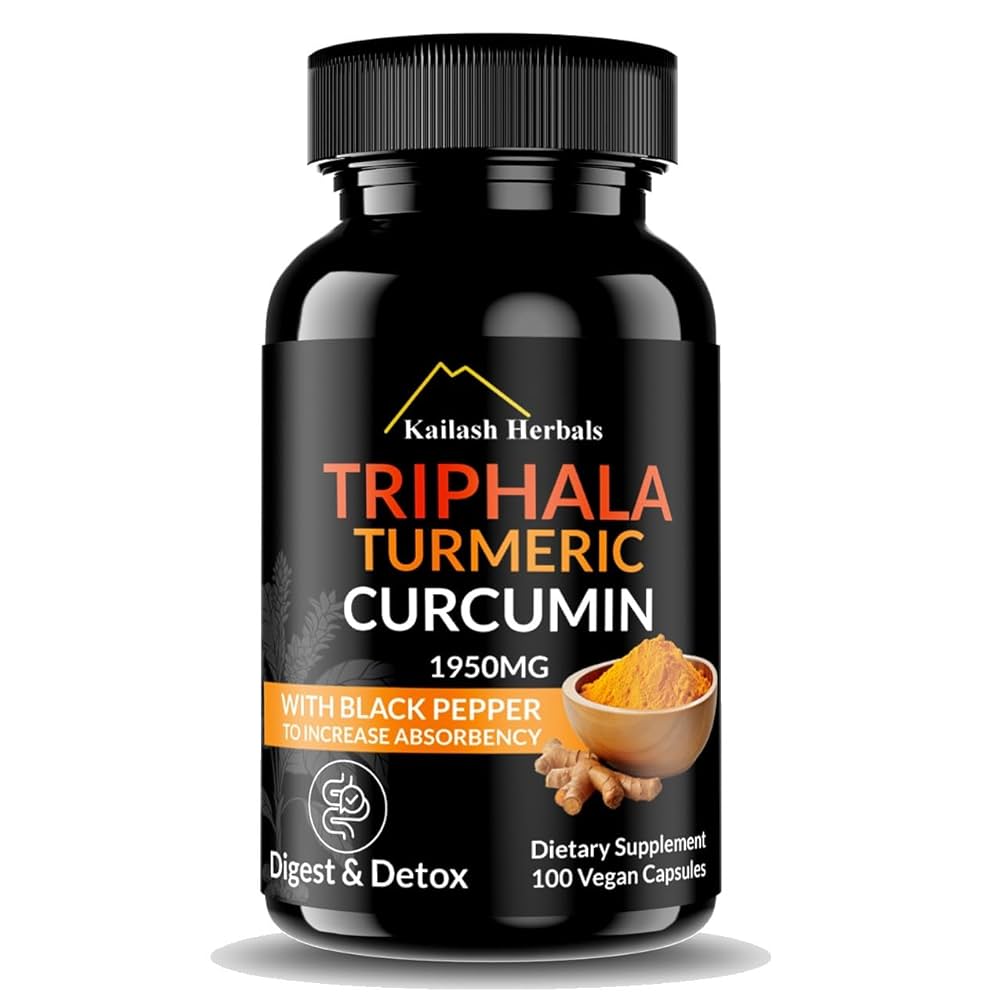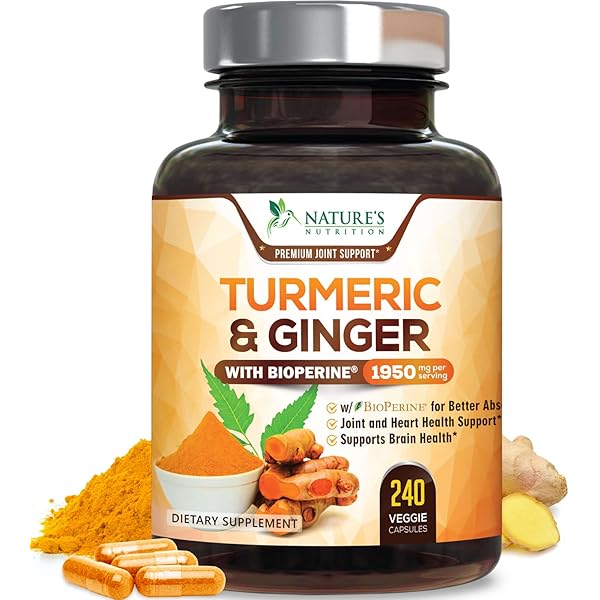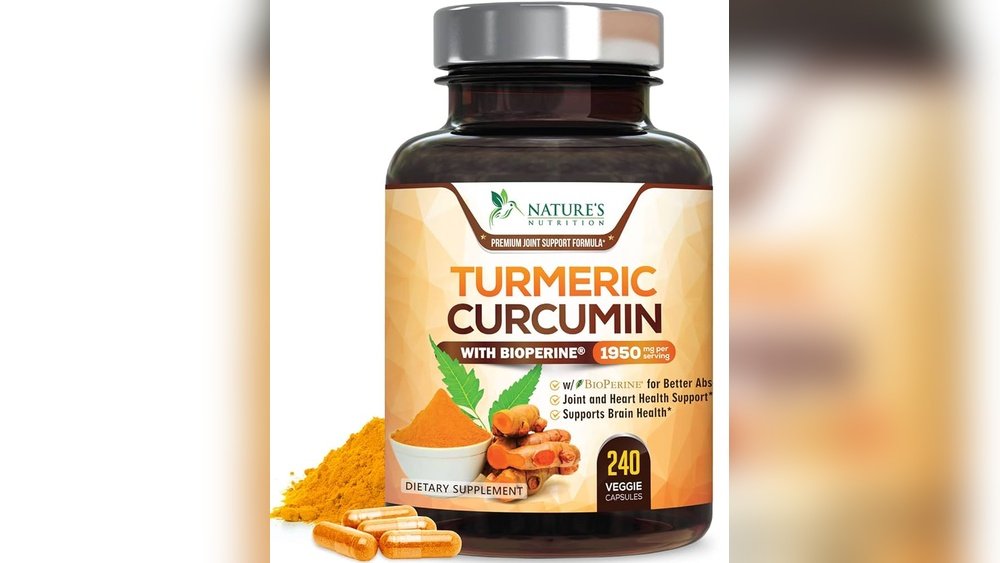Are you considering adding Turmeric Curcumin Supplement 1950Mg capsules to your daily routine? Before you do, it’s important to know both the powerful benefits and the possible side effects that come with this popular natural supplement.
Turmeric curcumin is praised for its anti-inflammatory and antioxidant properties, which may support your joint health, digestion, and overall wellness. But did you know it can also interact with certain medications and other supplements, potentially causing unwanted effects? You’ll discover everything you need to make an informed decision—how turmeric curcumin works, what it can do for you, and the precautions you should take to stay safe.
Keep reading to find out if this supplement is truly right for your health goals.

Credit: herbterra.com
Turmeric Curcumin Overview
Turmeric Curcumin is a popular supplement praised for its health benefits. It comes from turmeric, a bright yellow spice used in cooking and traditional medicine. Curcumin is the main active ingredient in turmeric. It has powerful anti-inflammatory and antioxidant effects. Many people use turmeric curcumin capsules to support joint health and improve overall wellness.
Understanding the basics of turmeric curcumin helps in making better choices about its use. The 1950mg capsules offer a specific dosage that balances potency and safety. Knowing what turmeric curcumin is and how much to take is important for anyone considering this supplement.
What Is Turmeric Curcumin?
Turmeric curcumin is a natural compound found in turmeric root. It gives turmeric its yellow color and many health properties. Curcumin works by reducing inflammation and fighting free radicals in the body. These effects may support healthy joints and improve digestion.
People often take turmeric curcumin to help with arthritis, muscle pain, and other inflammatory conditions. It is also studied for its potential benefits in heart health and brain function. Curcumin is not easily absorbed on its own, so supplements often include black pepper extract to improve absorption.
Dosage And Potency Of 1950mg Capsules
The 1950mg capsule dose refers to the total amount of turmeric root extract. Within this, the curcumin content is usually standardized to 95%. This means each capsule delivers a strong and consistent amount of curcumin.
This dose is effective for reducing inflammation and supporting overall health. It is important to follow the recommended dosage on the label. Taking too much may cause side effects like stomach upset or increased bleeding risk.
Many users take one or two capsules daily, often with meals. This helps improve absorption and reduces potential stomach discomfort. Consulting a healthcare professional before starting any new supplement is always a safe practice.
Health Benefits
Turmeric Curcumin Supplement 1950Mg capsules offer many health benefits. These capsules contain curcumin, the active compound in turmeric. Curcumin is known for its powerful effects on the body. Many people use it to support overall wellness and address specific health issues. Below are some key health benefits of turmeric curcumin supplements.
Anti-inflammatory Effects
Curcumin helps reduce inflammation in the body. It blocks molecules that cause inflammation. This can relieve pain and swelling. People with arthritis often find it helpful. Lower inflammation supports better health and comfort.
Antioxidant Properties
Curcumin acts as a strong antioxidant. It fights harmful free radicals in the body. Free radicals can damage cells and cause aging. Antioxidants protect cells and slow down damage. This helps maintain healthy skin and organs.
Supports Joint Health
Turmeric curcumin supports joint health by reducing stiffness. It improves mobility and reduces joint pain. Many users report better comfort during daily activities. It may also protect joints from long-term damage.
Boosts Immune System
Curcumin boosts the immune system by enhancing the body’s defense. It helps fight infections and diseases. A stronger immune system means fewer illnesses. Regular use can support overall immune health.
Improves Digestion
Turmeric curcumin aids digestion by stimulating bile production. This helps break down fats and absorb nutrients. It can reduce bloating and gas. Better digestion supports overall gut health.
Enhances Brain Function
Curcumin may improve memory and focus. It supports brain health by increasing growth factors. These factors help brain cells grow and survive. It may lower the risk of brain diseases.
Potential Side Effects
Turmeric Curcumin supplements at 1950mg strength offer many health benefits. Despite this, some people may experience side effects. Knowing potential side effects helps you use the supplement safely. Side effects can range from mild to serious and vary by individual health conditions.
Common Mild Reactions
Some users report mild stomach upset or nausea. Diarrhea or bloating can occur but usually fades quickly. Minor allergic reactions like skin rash or itching may appear. These mild effects often happen when starting the supplement or increasing the dose.
Rare But Serious Effects
Serious side effects are uncommon but possible. Some people may face increased bleeding risk due to turmeric’s blood-thinning properties. Liver problems may develop in rare cases. Severe allergic reactions like swelling or difficulty breathing require immediate medical help.
Risks For Specific Groups
Pregnant or breastfeeding women should avoid turmeric supplements. People with liver disease or gallstones face higher risks from turmeric use. Those taking blood thinners or diabetes medication need caution. Always check with a healthcare provider before starting turmeric if you belong to these groups.
Supplement Interactions
Turmeric Curcumin supplements can interact with other supplements and medications. These interactions may affect how your body responds. Knowing which supplements to avoid helps prevent unwanted side effects.
Blood-thinning Supplements To Avoid
Turmeric has natural blood-thinning properties. Taking it with supplements like vitamin E, ginkgo biloba, garlic, ginger, or N-acetyl cysteine (NAC) can increase bleeding risk. Avoid combining these without medical advice.
Iron Absorption Concerns
Turmeric may reduce how well your body absorbs iron. Taking iron supplements together with turmeric can lower iron levels. Space out these supplements or consult a healthcare provider for guidance.
Blood Sugar-lowering Supplements
Turmeric can lower blood sugar. Using it with other blood sugar-lowering supplements may cause blood sugar to drop too low. Monitor your levels carefully and seek professional advice if needed.
Liver-impacting Supplements
Turmeric may affect liver function. Avoid taking it with other supplements that impact the liver. This helps reduce the risk of liver damage or side effects.
Medication Interactions
Turmeric Curcumin supplements can interact with various medications. Knowing these interactions helps avoid unwanted effects. These supplements influence how some drugs work in the body. Careful use and medical advice are important for safety.
Effects On Blood Pressure Drugs
Turmeric may lower blood pressure slightly. Taking it with blood pressure medicine can cause blood pressure to drop too low. This can lead to dizziness or fainting. Doctors often recommend monitoring blood pressure regularly. Adjusting medication doses might be necessary.
Interaction With Losartan
Losartan is a common drug for high blood pressure. Turmeric may increase its effects. This can cause very low blood pressure or kidney problems. Patients should avoid taking high doses of turmeric with losartan. Always discuss with a healthcare provider before combining them.
Precautions With Diabetes Medications
Turmeric can lower blood sugar levels. Using it with diabetes drugs may cause blood sugar to fall too low. Low blood sugar can cause weakness, confusion, or sweating. People with diabetes should check their blood sugar often. Medical guidance is crucial to adjust medicine if needed.

Credit: www.amazon.com
When To Avoid Turmeric
Turmeric is a popular supplement known for its health benefits. Still, certain groups should avoid it to stay safe. Knowing when to avoid turmeric helps prevent unwanted side effects or health risks. Some conditions and situations require caution before using turmeric curcumin capsules.
Pregnancy And Breastfeeding
Pregnant women should avoid turmeric supplements. High doses can cause uterine contractions or bleeding. Breastfeeding mothers should also steer clear. There is not enough research on turmeric’s safety during breastfeeding. Natural turmeric in food is usually safe, but supplements are not recommended.
Existing Health Conditions
People with liver disease should avoid turmeric supplements. Turmeric may worsen liver problems. Those with gallstones or kidney stones should be cautious. Turmeric can increase bile production, which may cause pain. Avoid turmeric if you have hormone-sensitive cancers. It might affect hormone levels and interfere with treatment.
Before Surgery
Avoid turmeric at least two weeks before surgery. Turmeric can thin the blood and increase bleeding risk. It may interfere with blood clotting during or after surgery. Always inform your doctor if you take turmeric supplements before any procedure. Stopping turmeric early helps lower the risk of complications.
Safe Usage Tips
Using Turmeric Curcumin Supplement 1950Mg Capsules safely is important for good health. Following clear tips helps avoid side effects and ensures the best benefits. Careful use supports your body and reduces risks.
Consulting Healthcare Professionals
Talk to a doctor before starting turmeric supplements. They can check for any health issues or medicine interactions. This step is vital if you have liver problems or take blood thinners. A healthcare professional gives advice tailored to your health needs.
Choosing Quality Supplements
Select supplements from trusted brands with good reviews. Look for products tested by third parties for purity. Avoid cheap or unknown sources to reduce risk of contamination. Quality capsules offer better absorption and effectiveness.
Monitoring Dosage And Duration
Follow the recommended dose on the supplement label. Do not take more than suggested to avoid side effects. Limit use to a few months unless a doctor advises otherwise. Watch for any unusual reactions and stop use if needed.

Credit: www.amazon.com
Frequently Asked Questions
What Happens If I Take Turmeric Curcumin Every Day?
Taking turmeric curcumin daily may reduce inflammation and improve joint health. It can also lower blood sugar and support liver function. Avoid combining it with blood-thinning or blood-sugar-lowering medications. Consult a doctor if pregnant, breastfeeding, or having medical conditions.
Does Turmeric Curcumin Have Any Side Effects?
Turmeric curcumin may cause mild side effects like stomach upset, nausea, or dizziness. It can increase bleeding risk and interact with blood thinners. Avoid during pregnancy and with certain medications. Consult a healthcare professional before use, especially if you have liver issues or take blood sugar or clotting drugs.
What Vitamins Should Not Be Taken With Turmeric?
Avoid taking vitamin E with turmeric due to increased bleeding risk. Also, avoid iron supplements and blood-thinning, blood-sugar-lowering, or liver-affecting supplements without medical advice. Consult a healthcare professional before combining turmeric with any vitamins or medications.
Does Turmeric Interact With Losartan?
Turmeric may increase losartan levels in the body, raising risks of side effects like dizziness and muscle cramps. Consult a doctor before combining them.
Conclusion
Turmeric curcumin capsules offer several health benefits like reducing inflammation and supporting joint health. Taking 1950mg daily can help, but watch for side effects such as stomach upset or blood thinning. Avoid combining turmeric with vitamin E, blood thinners, or blood sugar medications without a doctor’s advice.
People with liver issues or pregnant women should be cautious. Always consult a healthcare professional before starting any supplement. Safe use brings the best results.



